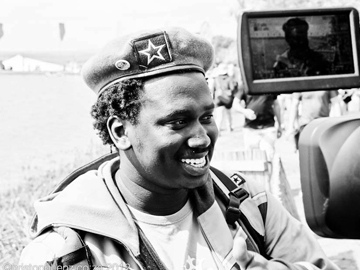

Sdumo Viwe. Photo by Sdumo Viwe.
12 March 2014
In a business as tough as the entertainment industry, artist management can be crucial, but the role and importance of an artist manager is often misunderstood.
Even talented artists often struggle to make a success because they only understand the talent part of the industry, not the business side. This is where an artist manager comes in.
Upcoming artist from Langa, Sdumo Viwe, for instance, says he has been struggling without an artist manager to handle studio sessions, performances and the business administration on his own.
“There is a constant pressure of having to work on new songs and performances whilst you still have to deal with the business administration,” says Viwe.
Nandipha Tuku, who currently manages DJ Kaunda, said the role of a manager is “to make sure that the artist stays on top of his game, most importantly pushes the barriers and goes where an artist cannot.”
When asked whether artist managers are there to babysit artists, Tuku says, “No, they are there to direct them to their goals. If an artist is goal orientated, it makes a manager’s life easier, no babysitting … Most artists know what to do to grow their brand, but at some point they need assistance in managing the brand from a business perspective.”

Thabo Mobo. Photo by Thabo Mobo.
Sinethemba Dangazele, who manages Mishpoetry, says to be a good artist manager, you need to have “vision, creativity, risk-taking and leadership skills …Vision in terms of where and what are you working for; creativity as to how you will implement your plans, and leadership.”
There is a demand for good artist managers, and managers have to make the tough decision of choosing which artists to manage. Artist managers look for qualities in artists they are willing to work with.
“In order for me to consider managing someone there has to be something to manage,” says Thabo Mobo, who manages DiloXClusiv under Black Mango Music. “Artists always seem to think that managers are there to make miracles happen. For me, personally, I work with artists who are driven and are prepared to work hard”.
Most upcoming artists would love to have an artist manager, but do not consider it financially viable as they are still struggling to make some sort of income for themselves. How can artists overcome this predicament?
“My advise is always do as much as you can yourself until you feel that you cannot handle the workload … That is a good way to learn how the industry works,” says Mobo.
Black Mango in association with Bridges for Music host workshops on a regular basis.
“I study events management”, says Dangazele, “that makes it easier for me because I go to a lot of events to evaluate and assess whatever is happening. I attend a lot of conferences, workshops, and I go to a lot of events to scout for talent … that is how I gain insight on the industry as a whole.”
Mobo points out that there is no formal education required in South Africa as it is one of those industries where schooling is done over time on the job. However, he says, a qualification related to business and marketing would be useful.
Commenting on the state of the Cape Town music industry, Mobo says, “Management is just part of the problem … I always say to artist that we are in the business of music, and people need to understand that like in any other industry, you need to understand how things work in this business … knowledge is power and ignorance is bliss”.